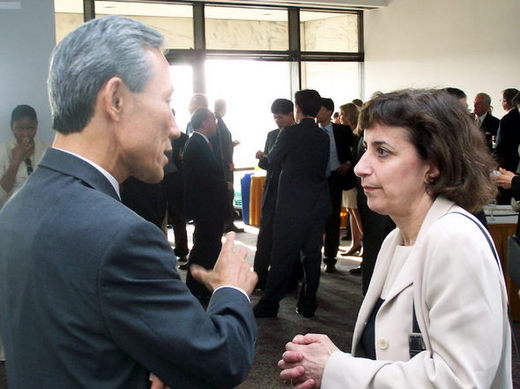 |
|
Kim Jong-hoon, left, top Korean negotiator, chats with his American counterpart Wendy Cutler at a receptipn in Washington on June 6. Washington/Yonhap
|
Both sides continue to hold fast to their demands
With free-trade talks between South Korea and the U.S. entering their third day, officials on both sides continue to face hurdles which threaten to derail the future of the negotiations. In Washington, about 300 delegates from the two nations, headed by South Korea’s top negotiator Kim Jong-hoon and Assistant U.S. Trade Representative Wendy Cutler, started the first official negotiations on a free trade agreement between the two nations June 5. On the second day of talks, both sides committed to writing which areas they seek to work through during the negotiations.However, sources close to the matter said that the countries disagree on nearly all crucial items, signaling a bumpy road ahead. As negotiations Wednesday in Washington move to contentious areas including the textile and service industries and the environment, experts predict things will get more intense. Challenges ahead "In the second round of talks, Korea and the U.S. failed to find common ground on the topic of labor," South Korea’s top negotiator Kim Jong-hoon said. Another member of the South Korean delegation said, "We are [negotiating] while at the same time learning U.S. labor codes," suggesting that the South Korean team is having difficulty in making headway in the area. As for the North’s Kaesong industrial complex, products from which Seoul wants designated as South Korean, both sides failed to reach an agreement, sources said. During the second day’s proceedings, South Korea urged the U.S. government to recognize goods from the complex as part of South Korean production. "The request was not accepted," Mr. Kim said. He said that the issue should not only be viewed from an economic perspective but from the perspectives of North-South and North-U.S. relations. The Kaesong product issue will remain a standing hurdle for a free trade pact with the U.S., Mr. Kim added. Going will get tougher Both countries have also failed to agree on how to regulate genetically modified crops. Other daunting tasks for negotiators include the issue of intellectual property protection as well as control of the communications sector, sources close to the matter said. Starting Wednesday, the delegates will discuss on six major topics including the service, automotive and medical industries, as well as various general trade regulations, areas in which both nations have not seen eye-to-eye in the first place. To try to counteract any roadblocks for negotiation, the countries established two working groups to deal with the automotive and medical industries separately, a move called by insiders "unprecedented" in the history of global trade negotiation. The thorny issues that existed before the start of the talks are still in the picture, Mr. Kim said. "There is what we want, and there is the U.S. wants," he said. "As time goes by, we will find where we can take and where we have to give."





